Unit 3 Understanding each other Skills building 1: completing a text
文档属性
| 名称 | Unit 3 Understanding each other Skills building 1: completing a text |
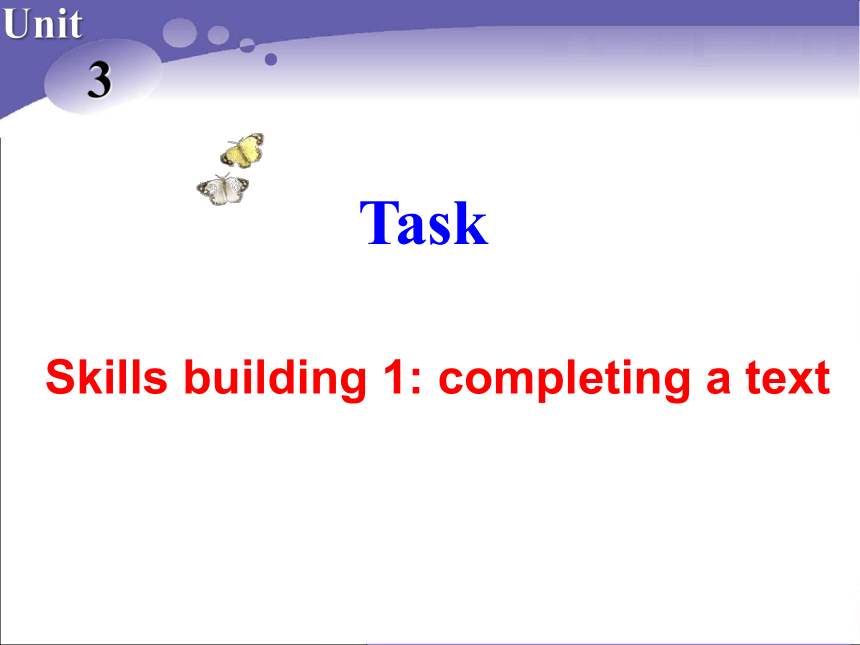
|
|
| 格式 | rar | ||
| 文件大小 | 369.1KB | ||
| 资源类型 | 教案 | ||
| 版本资源 | 牛津译林版 | ||
| 科目 | 英语 | ||
| 更新时间 | 2009-12-10 00:00:00 | ||
图片预览

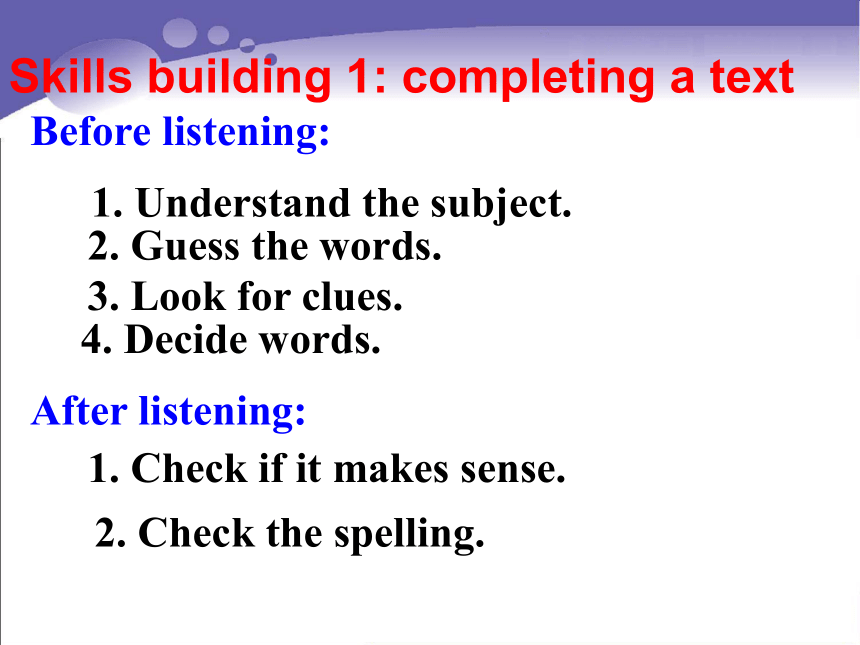

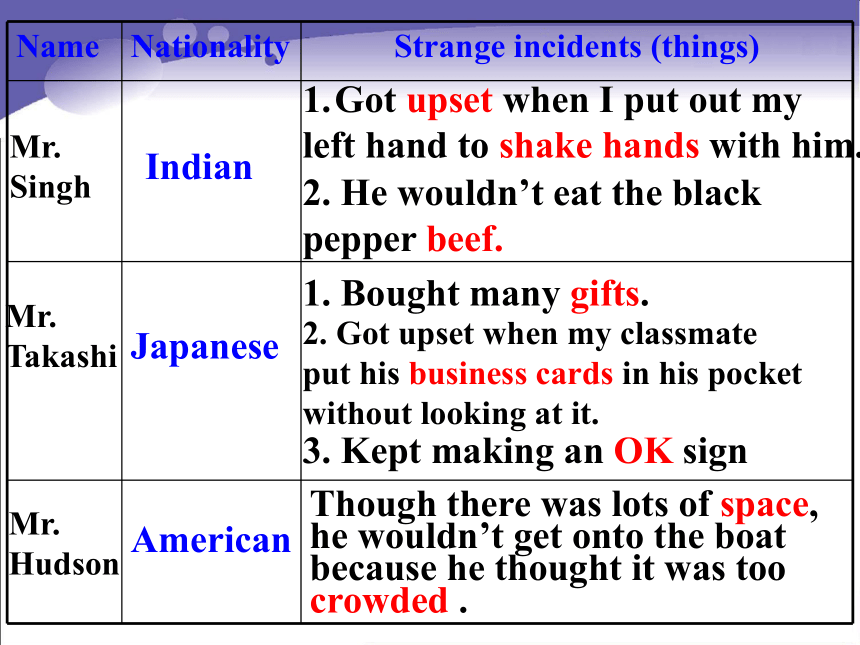
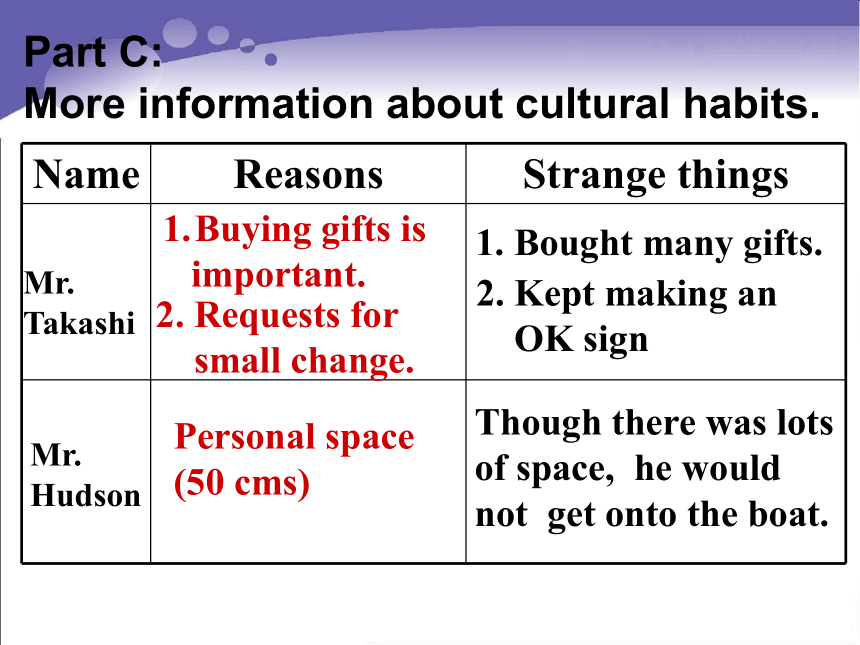
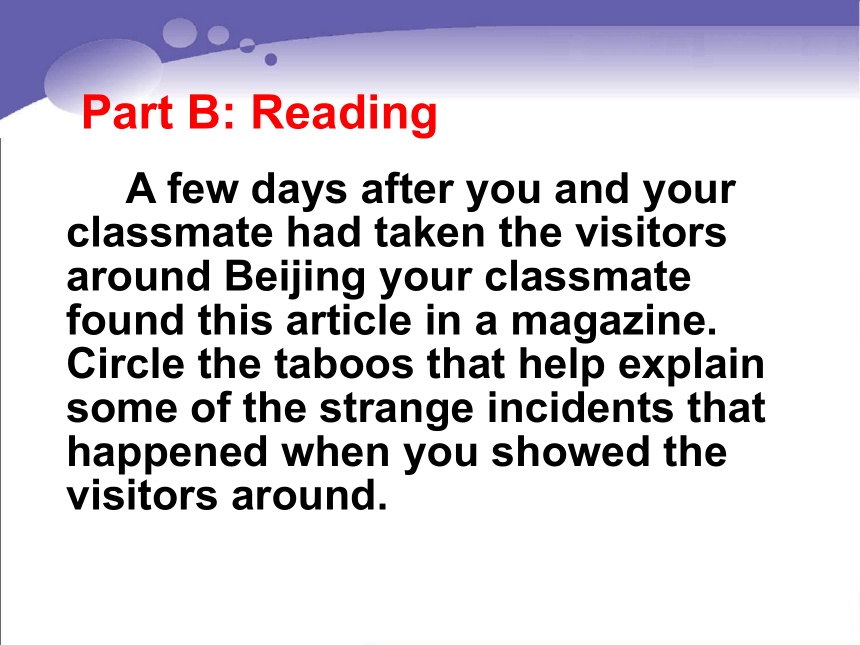
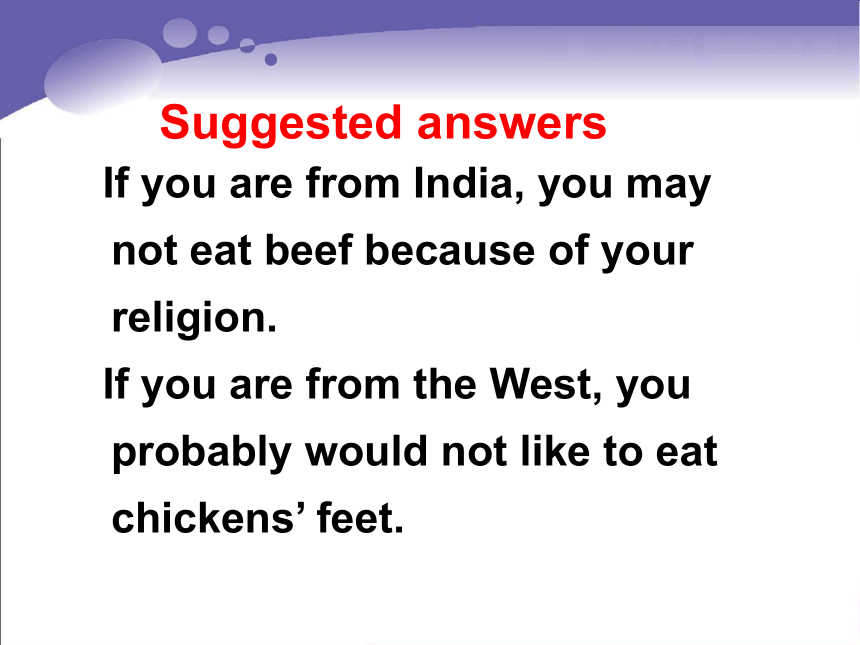
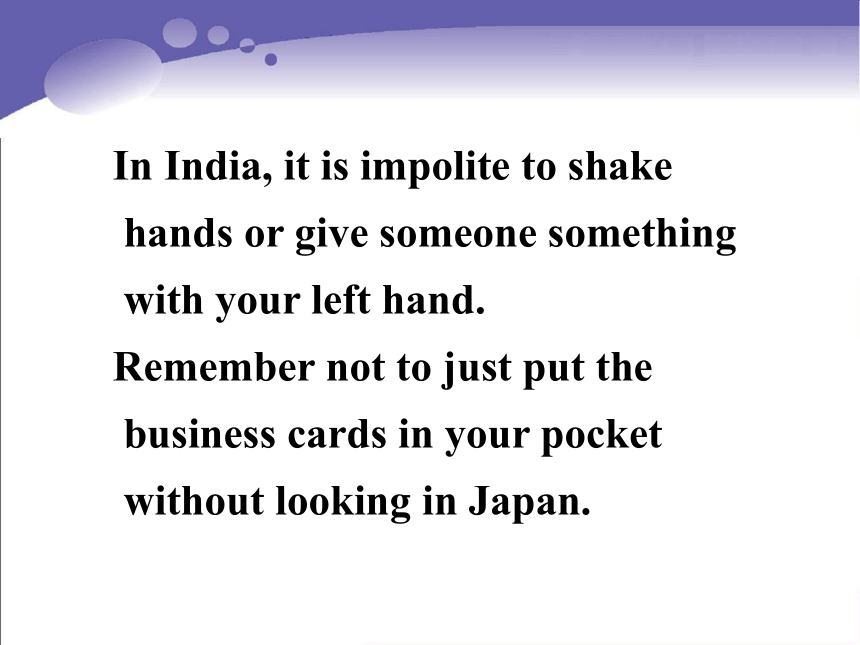
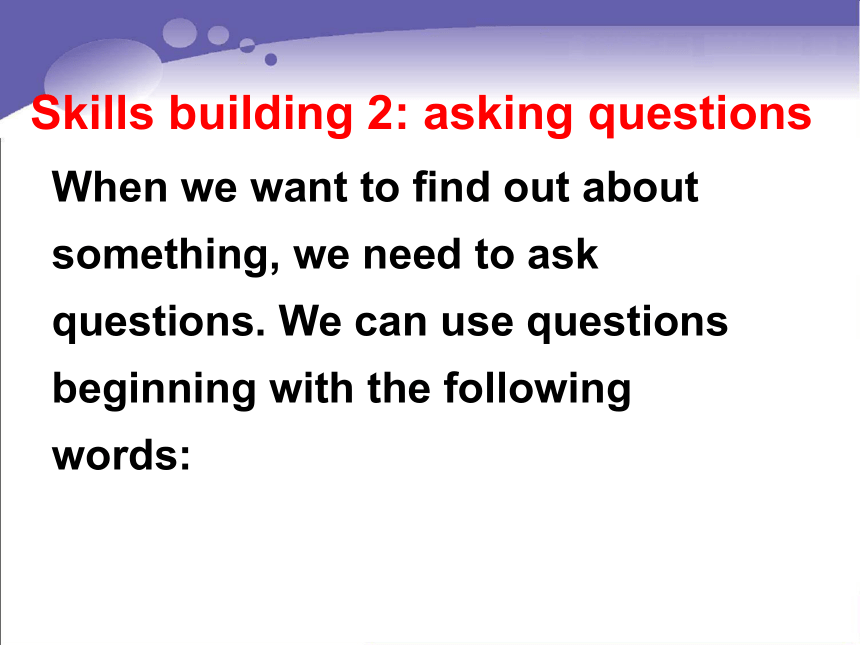
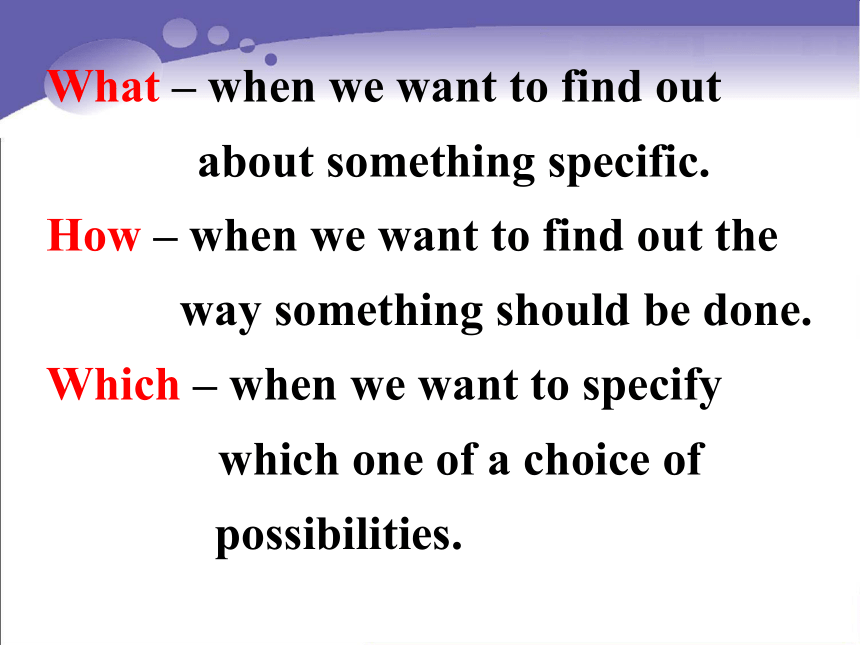
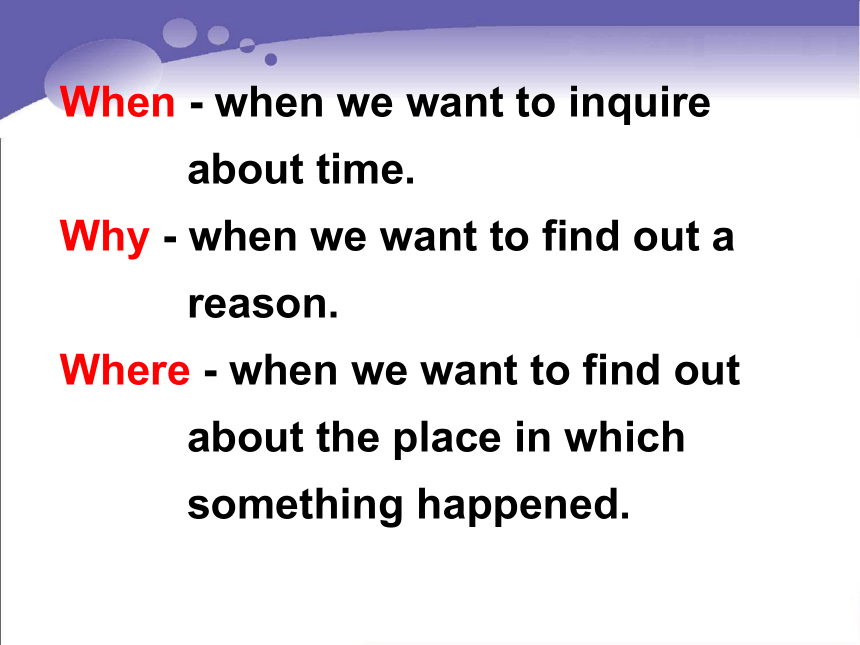
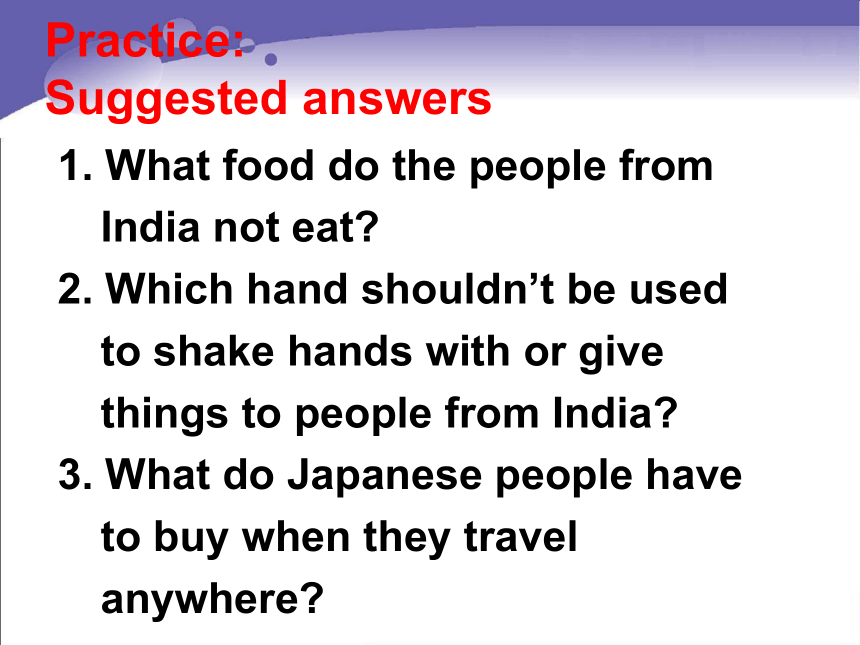
文档简介
课件34张PPT。Task
Unit3Skills building 1: completing a textBefore listening: 1. Understand the subject.2. Guess the words.3. Look for clues.4. Decide words.Skills building 1: completing a textAfter listening:1. Check if it makes sense. 2. Check the spelling.Step 1:
Showing foreign visitors around
Read the text quickly to get the main idea of it and try to guess what words will be filled in the blanks.
Listen to the tape and complete the text.
Mr.
SinghMr.
TakashiMr.
HudsonIndian Japanese American Got upset when I put out my
left hand to shake hands with him.2. He wouldn’t eat the black
pepper beef.1. Bought many gifts.2. Got upset when my classmate
put his business cards in his pocket
without looking at it.3. Kept making an OK signThough there was lots of space,
he wouldn’t get onto the boat because he thought it was too crowded .Part C:
More information about cultural habits.Mr.
TakashiMr.
Hudson1. Bought many gifts.2. Kept making an
OK signThough there was lots
of space, he would
not get onto the boat.Buying gifts is
important.2. Requests for
small change.Personal space
(50 cms) A few days after you and your classmate had taken the visitors around Beijing your classmate found this article in a magazine. Circle the taboos that help explain some of the strange incidents that happened when you showed the visitors around.Part B: Reading If you are from India, you may not eat beef because of your religion.
If you are from the West, you probably would not like to eat chickens’ feet.Suggested answers In India, it is impolite to shake hands or give someone something with your left hand.
Remember not to just put the business cards in your pocket without looking in Japan. Skills building 2: asking questionsWhen we want to find out about something, we need to ask questions. We can use questions beginning with the following words:What – when we want to find out about something specific.
How – when we want to find out the way something should be done.
Which – when we want to specify which one of a choice of possibilities.When - when we want to inquire about time.
Why - when we want to find out a reason.
Where - when we want to find out about the place in which something happened.1. What food do the people from India not eat?
2. Which hand shouldn’t be used to shake hands with or give things to people from India?
3. What do Japanese people have to buy when they travel anywhere?Practice:
Suggested answers4. What should you do when a Japanese person gives you a business card?
5. What does the OK sign mean for Japanese people?
6. Why do people from the USA do not like crowded places?Beijing Sunshine Secondary School Sunshine Town Beijing 100000
10 JuneMr Singh88 Sunny Street
Sunshine Town
Beijing 100000Address of the senderDateName of the receiver
Address of the receiver
How to write an English letter?Dear Mr Singh,Content of the letterYours sincerely,xxxGreeting
MessageClosing
Name of the sender
Skills building 3: writing a letter of apology your address
the date
an opening
the purpose of the letter should be
given in the first sentence.
an explanation
a closing phrase (to apologize again)
your name and signature
PracticeYou want to write a letter of apology to
the foreign visitors to explain
misunderstandings. Find a partner and
discuss what to include in the letter.
Each person should write a different
part.
A possible version
Dear Mr singh,
I am writing to apologize for any misunderstandings that occurred when I showed you around Beijing the other day.Beijing Sunshine Secondary
School Sunshine Town
Beijing 100000
June 10th88 Sunny Street
Sunshine Town
Beijing 100000I felt rather strange when you would not shake hands with me. I did not realize that there are some taboos in different countries and cultures. After reading a magazine article, I know that people from India do not shake hands with their left hands. I should not have held out my left hand to you. And I now know you do not eat beef because of your religion.
I feel very sorry for not having known these taboos earlier. I hope you can forgive me for all these misuderstandings. I hope our next meeting will be happier.
Yours sincerely,
(xxx)
habit n. 习惯;惯常行为,习性
You need to change your eating habits.
你得改变你的饮食习惯。
I only do it out of habit. 我这么做只是出于习惯。
拓展:
in the habit of… 习惯……
get into the habit of… 养成了……的习惯
develop the habit of… 形成……的习惯
have the habit of … 有……的习惯
break the habit of… 改掉……的习惯
I’m in the habit of getting up early.
我养成了早起床的习惯。
He is trying to break the habit of staying up too late.
他正努力改掉熬夜太晚的习惯。custom n. 风俗,习俗
Different countries have different customs.
不同的国家有不同的风俗习惯。
It’s the custom in that country for women to marry young.
女子早婚是那个国家的风俗。
注意:custom表示习俗的总称时,为不可数名词。
Custom has a great influence on his behavior.
习俗对他的行为举止影响很大。
habit : 指一种动作因人反复地做,习惯而成自然,做时不
需思考,常用来指个人习惯。
Biting his fingers is his habit. 咬手指是他的习惯。
custom: 指某一群人不断沿用而变成的惯例,常指某种习
俗或风俗。
Eating hot dogs is an American custom.
吃热狗是美国人的一种习惯。2. sound v. 听起来似乎
sound + adj. 听起来……
常见搭配:sound like + n. 听起来像……
It sounds as if/ though… 听起来似乎……
What you said sounds reasonable. 你说的话听起来有道理。
How sweet the music sounds! 音乐听起来多美啊!
Your idea sounds (like) a good one. 你的主意听起来不错。
It sounds as though/if the government don’t know what to
do. 听起来政府似乎不知道做什么。
注意:其他感官动词也是系动词。如:feel 感到;look 看
起来;smell 闻起来;taste 尝起来,这些系动词在句
中不能用被动形式。
—— Shall we go out for dinner tonight?
—— ______. (2008浙江高考)
You are right. B. It must be funny.
C. That sounds great. D. Have a nice time.Capproval n. 同意,赞成;批准,认可(计划等)
She wanted to win her father’s approval.
她想赢得她父亲的赞同。
Several people nodded in approval.
好几个人点头表示同意。
I can’t agree to anything without my partner’s approval.
没有合伙人的认可我什么也不能答应。
单词积累:
approve v. 赞成;同意 approving adj. 赞成的4. take up ① 继续,接下去
Let’s take up the text where we finished yesterday.
我们从昨天停下的地方继续学课文。
② 占用(时间);占据(空间)
Her time is fully taken up with writing.
她把时间全部用在了写作上。
The table takes up too much room. 这张桌子太占地儿。
③(将衣服等)改短
This shirt needs taking up. 这条裙子需要改短。
④ (尤指为消遣)学着做;开始做
They’ve taken up golf. 他们学起打高尔夫来了。
⑤ 开始从事
He’ll take up his duties next week. 他下周开始履行职责。
We tried to find a table for seven, but they were all _____.
A. given away B. kept away C. taken up D. used up C5. give out
① 用完,耗尽
After a month their food supplies gave out.
一个月以后他们的食物储备耗尽了。
②停止运行/运转
One of the plane’s engines gave out in mid-Atlantic.
飞机飞到大西洋中部时一个发动机失灵了。
③分发;分散
The teacher gave out the exam papers.
老师分发了试卷。
④ 发出,放出(热,光等)
The radiator gives out a lot of heat.
散热器释放出大量的热。
拓展:
give away 泄露;暴露 give back 归还
give in 屈服;投降 give up 放弃
give off 发出,放出(气味, 热, 光等)
经典回放: (2008 江西高考)
If a person has not had enough sleep, his actions will give
him _____ during the day.
A. away B. up C. in D. back Ahold up ① 支持住;承受住;支撑得住
he’s holding up well under the pressure. 他承受住了压力。
② 支撑;举起;抬起
You’d better hold up your grandma. 你最好扶着你奶奶。
③ 延迟;阻碍
An accident is holding up traffic.
一场事故造成了交通阻塞。
④ 举出(例子);提出……(作为榜样)
She’s always holding up her children as models of good
behavior. 她总是举例说自己孩子表现好。
hold back 阻拦;阻挡 hold off 推迟;延迟
hold on 穿着;停住;别挂断 hold out 坚持
hold together 保持团结
____ a moment and I will go to your rescue. (2008 福建)
A. Go on B. Hold on C. Move on D. Carry on B7. remark n. 谈论, 言论, 评论; 引人注目, 值得注意
He made a number of rude remarks about the food.
对于这种食物他说了许多无理的评论。
What exactly did you mean by that last remark?
你最后那句话究竟是什么意思?
v. 说;写;评论
常见搭配: remark on/ upon … 对……评论
remark + that-clause 评论……
The judges remarked on the high standard of entries for
the competition. 评委们说明了参赛的高标准。
Critics remarked that the play was not original.
评论家们指出这部戏剧缺乏创意。
单词积累:
remarkable adj. 非凡的; 奇异的; 引人注目的
remarkably adv. 非凡地;引人注目地contact n. 触摸, 接触; 联系
He has a fear of physical contact. 他对身体接触有恐惧感。
I don’t have much contact with my uncle.
我和叔叔联系不多。
v. (用电话、无线电、书信等)与某人(或某物)
联系;与……来往;联系;接触
I shall contact you by telephone on Friday.
星期五我跟你电话联系。
We arranged to contact again as soon as possible.
我们约好尽快联系。
When the two wires contact, the machine starts.
这两根线一接触机器就开动。
keep in contact with… 与……保持联系
lose contact with … 与……失去联系
Have you kept contact with your college friends?
She’s lost contact with her son. Phrases 带某人到处转转 take/show sb. around
碰到一些奇怪的事情
come across some strange incidents
点了一份真正的大餐
order a real feast
紫禁城 the Forbidden City
应付,处理 do with
占据(时间和空间)take up
分发名片 give out business cards
有些不高兴 get a bit upset 经历适当的过程
go through the proper procedure
作一个OK的手势
make an OK sign
请求帮助(request)
make a request for help
颐和园
the Summer Palace
被堵塞了/被耽搁了
be /get held up
起源于……
与宗教有关
肢体语言
相关的人
与……接触
与……交往
用紧紧握手来打招呼
微微鞠躬
have one’s origin in sth
be connected to religion
body language
the people concerned
be in contact with
interact with sb
greet one another with a
firm handshake
greet with a slight bow
show … around; hold out; do with; take up; shake hands with; go through; hold up; incident; remark; give out; We ________ the visitors ________ our school.
Some strange ________ occurred to me.
Chinese people like to _________________ each other when they meet.
I have no idea what he will _________ so many presents.
It was very odd how he reacted when you _________ your left hand to shake hands.showed aroundincidentsshake hands withdo withheld outtake up; go through; hold up; remark; give out;6. The Japanese always __________ their business cards when they meet each other.
7. You broke the rules here because you didn’t ___________ the proper procedure.
8. The building of the road got ________ by bad weather.
9. Studying _________ most of my time.
10. As he often _________, one is never too old to learn.give outgo throughheld uptakes upremarks
Unit3Skills building 1: completing a textBefore listening: 1. Understand the subject.2. Guess the words.3. Look for clues.4. Decide words.Skills building 1: completing a textAfter listening:1. Check if it makes sense. 2. Check the spelling.Step 1:
Showing foreign visitors around
Read the text quickly to get the main idea of it and try to guess what words will be filled in the blanks.
Listen to the tape and complete the text.
Mr.
SinghMr.
TakashiMr.
HudsonIndian Japanese American Got upset when I put out my
left hand to shake hands with him.2. He wouldn’t eat the black
pepper beef.1. Bought many gifts.2. Got upset when my classmate
put his business cards in his pocket
without looking at it.3. Kept making an OK signThough there was lots of space,
he wouldn’t get onto the boat because he thought it was too crowded .Part C:
More information about cultural habits.Mr.
TakashiMr.
Hudson1. Bought many gifts.2. Kept making an
OK signThough there was lots
of space, he would
not get onto the boat.Buying gifts is
important.2. Requests for
small change.Personal space
(50 cms) A few days after you and your classmate had taken the visitors around Beijing your classmate found this article in a magazine. Circle the taboos that help explain some of the strange incidents that happened when you showed the visitors around.Part B: Reading If you are from India, you may not eat beef because of your religion.
If you are from the West, you probably would not like to eat chickens’ feet.Suggested answers In India, it is impolite to shake hands or give someone something with your left hand.
Remember not to just put the business cards in your pocket without looking in Japan. Skills building 2: asking questionsWhen we want to find out about something, we need to ask questions. We can use questions beginning with the following words:What – when we want to find out about something specific.
How – when we want to find out the way something should be done.
Which – when we want to specify which one of a choice of possibilities.When - when we want to inquire about time.
Why - when we want to find out a reason.
Where - when we want to find out about the place in which something happened.1. What food do the people from India not eat?
2. Which hand shouldn’t be used to shake hands with or give things to people from India?
3. What do Japanese people have to buy when they travel anywhere?Practice:
Suggested answers4. What should you do when a Japanese person gives you a business card?
5. What does the OK sign mean for Japanese people?
6. Why do people from the USA do not like crowded places?Beijing Sunshine Secondary School Sunshine Town Beijing 100000
10 JuneMr Singh88 Sunny Street
Sunshine Town
Beijing 100000Address of the senderDateName of the receiver
Address of the receiver
How to write an English letter?Dear Mr Singh,Content of the letterYours sincerely,xxxGreeting
MessageClosing
Name of the sender
Skills building 3: writing a letter of apology your address
the date
an opening
the purpose of the letter should be
given in the first sentence.
an explanation
a closing phrase (to apologize again)
your name and signature
PracticeYou want to write a letter of apology to
the foreign visitors to explain
misunderstandings. Find a partner and
discuss what to include in the letter.
Each person should write a different
part.
A possible version
Dear Mr singh,
I am writing to apologize for any misunderstandings that occurred when I showed you around Beijing the other day.Beijing Sunshine Secondary
School Sunshine Town
Beijing 100000
June 10th88 Sunny Street
Sunshine Town
Beijing 100000I felt rather strange when you would not shake hands with me. I did not realize that there are some taboos in different countries and cultures. After reading a magazine article, I know that people from India do not shake hands with their left hands. I should not have held out my left hand to you. And I now know you do not eat beef because of your religion.
I feel very sorry for not having known these taboos earlier. I hope you can forgive me for all these misuderstandings. I hope our next meeting will be happier.
Yours sincerely,
(xxx)
habit n. 习惯;惯常行为,习性
You need to change your eating habits.
你得改变你的饮食习惯。
I only do it out of habit. 我这么做只是出于习惯。
拓展:
in the habit of… 习惯……
get into the habit of… 养成了……的习惯
develop the habit of… 形成……的习惯
have the habit of … 有……的习惯
break the habit of… 改掉……的习惯
I’m in the habit of getting up early.
我养成了早起床的习惯。
He is trying to break the habit of staying up too late.
他正努力改掉熬夜太晚的习惯。custom n. 风俗,习俗
Different countries have different customs.
不同的国家有不同的风俗习惯。
It’s the custom in that country for women to marry young.
女子早婚是那个国家的风俗。
注意:custom表示习俗的总称时,为不可数名词。
Custom has a great influence on his behavior.
习俗对他的行为举止影响很大。
habit : 指一种动作因人反复地做,习惯而成自然,做时不
需思考,常用来指个人习惯。
Biting his fingers is his habit. 咬手指是他的习惯。
custom: 指某一群人不断沿用而变成的惯例,常指某种习
俗或风俗。
Eating hot dogs is an American custom.
吃热狗是美国人的一种习惯。2. sound v. 听起来似乎
sound + adj. 听起来……
常见搭配:sound like + n. 听起来像……
It sounds as if/ though… 听起来似乎……
What you said sounds reasonable. 你说的话听起来有道理。
How sweet the music sounds! 音乐听起来多美啊!
Your idea sounds (like) a good one. 你的主意听起来不错。
It sounds as though/if the government don’t know what to
do. 听起来政府似乎不知道做什么。
注意:其他感官动词也是系动词。如:feel 感到;look 看
起来;smell 闻起来;taste 尝起来,这些系动词在句
中不能用被动形式。
—— Shall we go out for dinner tonight?
—— ______. (2008浙江高考)
You are right. B. It must be funny.
C. That sounds great. D. Have a nice time.Capproval n. 同意,赞成;批准,认可(计划等)
She wanted to win her father’s approval.
她想赢得她父亲的赞同。
Several people nodded in approval.
好几个人点头表示同意。
I can’t agree to anything without my partner’s approval.
没有合伙人的认可我什么也不能答应。
单词积累:
approve v. 赞成;同意 approving adj. 赞成的4. take up ① 继续,接下去
Let’s take up the text where we finished yesterday.
我们从昨天停下的地方继续学课文。
② 占用(时间);占据(空间)
Her time is fully taken up with writing.
她把时间全部用在了写作上。
The table takes up too much room. 这张桌子太占地儿。
③(将衣服等)改短
This shirt needs taking up. 这条裙子需要改短。
④ (尤指为消遣)学着做;开始做
They’ve taken up golf. 他们学起打高尔夫来了。
⑤ 开始从事
He’ll take up his duties next week. 他下周开始履行职责。
We tried to find a table for seven, but they were all _____.
A. given away B. kept away C. taken up D. used up C5. give out
① 用完,耗尽
After a month their food supplies gave out.
一个月以后他们的食物储备耗尽了。
②停止运行/运转
One of the plane’s engines gave out in mid-Atlantic.
飞机飞到大西洋中部时一个发动机失灵了。
③分发;分散
The teacher gave out the exam papers.
老师分发了试卷。
④ 发出,放出(热,光等)
The radiator gives out a lot of heat.
散热器释放出大量的热。
拓展:
give away 泄露;暴露 give back 归还
give in 屈服;投降 give up 放弃
give off 发出,放出(气味, 热, 光等)
经典回放: (2008 江西高考)
If a person has not had enough sleep, his actions will give
him _____ during the day.
A. away B. up C. in D. back Ahold up ① 支持住;承受住;支撑得住
he’s holding up well under the pressure. 他承受住了压力。
② 支撑;举起;抬起
You’d better hold up your grandma. 你最好扶着你奶奶。
③ 延迟;阻碍
An accident is holding up traffic.
一场事故造成了交通阻塞。
④ 举出(例子);提出……(作为榜样)
She’s always holding up her children as models of good
behavior. 她总是举例说自己孩子表现好。
hold back 阻拦;阻挡 hold off 推迟;延迟
hold on 穿着;停住;别挂断 hold out 坚持
hold together 保持团结
____ a moment and I will go to your rescue. (2008 福建)
A. Go on B. Hold on C. Move on D. Carry on B7. remark n. 谈论, 言论, 评论; 引人注目, 值得注意
He made a number of rude remarks about the food.
对于这种食物他说了许多无理的评论。
What exactly did you mean by that last remark?
你最后那句话究竟是什么意思?
v. 说;写;评论
常见搭配: remark on/ upon … 对……评论
remark + that-clause 评论……
The judges remarked on the high standard of entries for
the competition. 评委们说明了参赛的高标准。
Critics remarked that the play was not original.
评论家们指出这部戏剧缺乏创意。
单词积累:
remarkable adj. 非凡的; 奇异的; 引人注目的
remarkably adv. 非凡地;引人注目地contact n. 触摸, 接触; 联系
He has a fear of physical contact. 他对身体接触有恐惧感。
I don’t have much contact with my uncle.
我和叔叔联系不多。
v. (用电话、无线电、书信等)与某人(或某物)
联系;与……来往;联系;接触
I shall contact you by telephone on Friday.
星期五我跟你电话联系。
We arranged to contact again as soon as possible.
我们约好尽快联系。
When the two wires contact, the machine starts.
这两根线一接触机器就开动。
keep in contact with… 与……保持联系
lose contact with … 与……失去联系
Have you kept contact with your college friends?
She’s lost contact with her son. Phrases 带某人到处转转 take/show sb. around
碰到一些奇怪的事情
come across some strange incidents
点了一份真正的大餐
order a real feast
紫禁城 the Forbidden City
应付,处理 do with
占据(时间和空间)take up
分发名片 give out business cards
有些不高兴 get a bit upset 经历适当的过程
go through the proper procedure
作一个OK的手势
make an OK sign
请求帮助(request)
make a request for help
颐和园
the Summer Palace
被堵塞了/被耽搁了
be /get held up
起源于……
与宗教有关
肢体语言
相关的人
与……接触
与……交往
用紧紧握手来打招呼
微微鞠躬
have one’s origin in sth
be connected to religion
body language
the people concerned
be in contact with
interact with sb
greet one another with a
firm handshake
greet with a slight bow
show … around; hold out; do with; take up; shake hands with; go through; hold up; incident; remark; give out; We ________ the visitors ________ our school.
Some strange ________ occurred to me.
Chinese people like to _________________ each other when they meet.
I have no idea what he will _________ so many presents.
It was very odd how he reacted when you _________ your left hand to shake hands.showed aroundincidentsshake hands withdo withheld outtake up; go through; hold up; remark; give out;6. The Japanese always __________ their business cards when they meet each other.
7. You broke the rules here because you didn’t ___________ the proper procedure.
8. The building of the road got ________ by bad weather.
9. Studying _________ most of my time.
10. As he often _________, one is never too old to learn.give outgo throughheld uptakes upremarks
